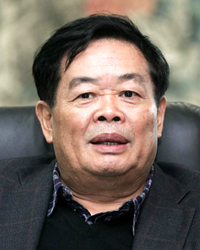| Generous Philanthropist
 |
|
(CFP) |
Cao Dewang, Board Chairman of the Fuzhou-based glass manufacturer Fuyao Group, ranked No.1 in the 2011 Hurun Philanthropy List, which was released on April 19. His family donated 4.58 billion yuan ($694 million) to charity in 2010. Cao has donated nearly 5 billion yuan ($758 million) since he made his first donation in 1983, accounting for 40 percent of his total wealth.
Cao, 65, founded Fuyao in 1987 and turned the company into a listed group in 1993. Cao donated 100 million yuan ($15.15 million) to the quake-hit Yushu County of Qinghai Province and 200 million yuan ($30.3 million) to drought-hit southwest China in 2010.
Microblog Pioneer
 |
|
(CFP) |
Cao Guowei, President and CEO of SINA Corp., features on Time magazine's list of the World's 100 Most Influential People released in April. Cao was selected for his contribution to forge Sina microblog into one of China's most open Internet platforms.
Cao created the twitter-like microblogging service in Sina.com. With advanced technology in uploading pictures and videos, Sina microblog enjoyed quick development and its users now include pop stars, sports celebrities, scholars, artists and hundreds of thousands of ordinary netizens, said Time magazine about the reasons for Cao's being listed.
Cao, 46, graduated in journalism from Fudan University in Shanghai and received a master's degree in journalism from University of Oklahoma and master's degree in accounting from the University of Texas in Austin. Cao joined SINA as vice president of finance in September 1999 and has served various managerial positions including CFO and COO. He became president and CEO of SINA since May 2006. In May 2009, Cao launched the microblogging service in Sina.com and the number of registered users had passed 100 million by the end of February 2011.
Board Chairman
 |
|
(CFP) |
Fu Chengyu, Board Chairman of China Petrochemical Corp. (Sinopec Group), one of China's state-owned petroleum giants, has been put under the spotlight as he was in charge of handling the group's corruption scandal involving its Guangdong branch. It's the first time that Fu has come into the public eye since he was appointed board chairman of the group on April 8.
Fu, 60, graduated with a master's degree in petroleum engineering from the University of Southern California. He became the general manager of China National Offshore Oil Corp. (CNOOC) in October 2003.
In June 2005 CNOOC, led by Fu, offered $18.5 billion to acquire California-based oil company Unocal. But, due to pressure from the U.S. Government, CNOOC withdrew its bid afterward. However, Fu's operation capability in the international capital market has won him a reputation.
"It would become the world's third largest free trade zone, with the three countries' (China, Japan and South Korea) combined economic volumes accounting for 20 percent of the world's total and having an aggregate population of 1.5 billion."
Former Chinese Vice Premier Zeng Peiyan, urging efforts to accelerate the establishment of a free trade zone among the three countries on April 25 at the Northeast Asia Trilateral Forum held in Hangzhou, Zhejiang Province
"China had 4.885 million effective registered trademarks by the end of March and it is estimated it will have 8 million at the end of 2015."
Fu Shuangjian, Deputy Director of the State Administration of Industry and Commerce in an interview with Xinhua News Agency on April 25
"China should reduce its excessive foreign exchange reserves and further diversify its holdings. The amount of foreign exchange reserves should be restricted to between $800 billion and $1.3 trillion."
Tang Shuangning, Chairman of China Everbright Group, saying the current reserve amount is too high at an annual finance forum in Beijing on April 23
"There has been explosive growth in the number of students and the number of graduates in the Chinese system. Clearly the top universities in China are able to compete with the best universities in the world."
Stuart McCutcheon, Vice Chancellor of the University of Auckland of New Zealand during an interview with Xinhuanet in Beijing on April 24
"The economic losses caused by the earthquake may hit 16 trillion to 25 trillion Japanese yen ($196 billion-$306 billion), which is two to three times more than the losses caused by the Osaka-Kobe Earthquake in 1995 and accounts for 5 percent of the annual gross national product."
Japanese Ambassador to China Niwa Uichiro, talking to Chinese media in Beijing on April 20 | 